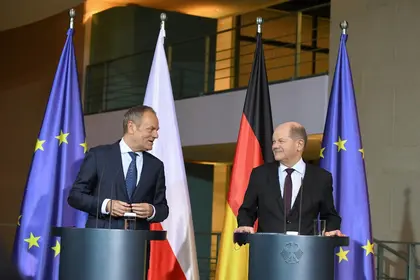In a bid to bolster security cooperation within Europe, leaders from Ukraine's allies France, Poland, and Germany convened on Monday, Feb. 12, amid mounting concerns over the potential resurgence of Donald Trump and its implications for Western unity against Russia's ongoing aggression in Ukraine.
During discussions in Berlin, Polish Prime Minister Donald Tusk underscored the importance of solidarity among European nations, drawing parallels to Alexandre Dumas's renowned work, "The Three Musketeers."
JOIN US ON TELEGRAM
Follow our coverage of the war on the @Kyivpost_official.
He said Poland was ready to stand shoulder to shoulder with France and stressed that the philosophy at the heart of relations between the European Union and NATO was based on the principle of "one for all, all for one".
"Together with France we are ready to fight for this security" of "all of Europe," he said, flanked by French President Emmanuel Macron.
Tusk also advocated for revitalizing the "Weimar Triangle," a historical platform for French, German, and Polish collaboration established in 1991, aiming to enhance coordinated action within Europe.
He said the three partners would "not relent on the question of Ukraine", adding that the alliance at the heart of NATO "can truly play a positive role".
His remarks were a subtle criticism of US presidential hopeful Trump, who alarmed America's European allies over the weekend by suggesting that he would support Russia in attacking any NATO country that fails to fulfill its financial commitments.

NATO Finds Gaping Holes in Europe’s Defences
German Chancellor Olaf Scholz condemned Trump's remarks as "irresponsible and dangerous", at a joint news conference with Tusk, who compared the comments to a "cold shower" for Europe.
Scholz hailed the renewed partnership among France, Germany, and Poland, emphasizing its significance in bolstering European unity.
Tusk returned to the post of Poland's prime minister in December, marking a break from years of right-wing rule and vowing to restore strong EU ties.
France, Germany and Poland are seeking to strengthen cooperation as Moscow's invasion of Ukraine enters a third year and Russian President Vladimir Putin grows more confident.
You can also highlight the text and press Ctrl + Enter






